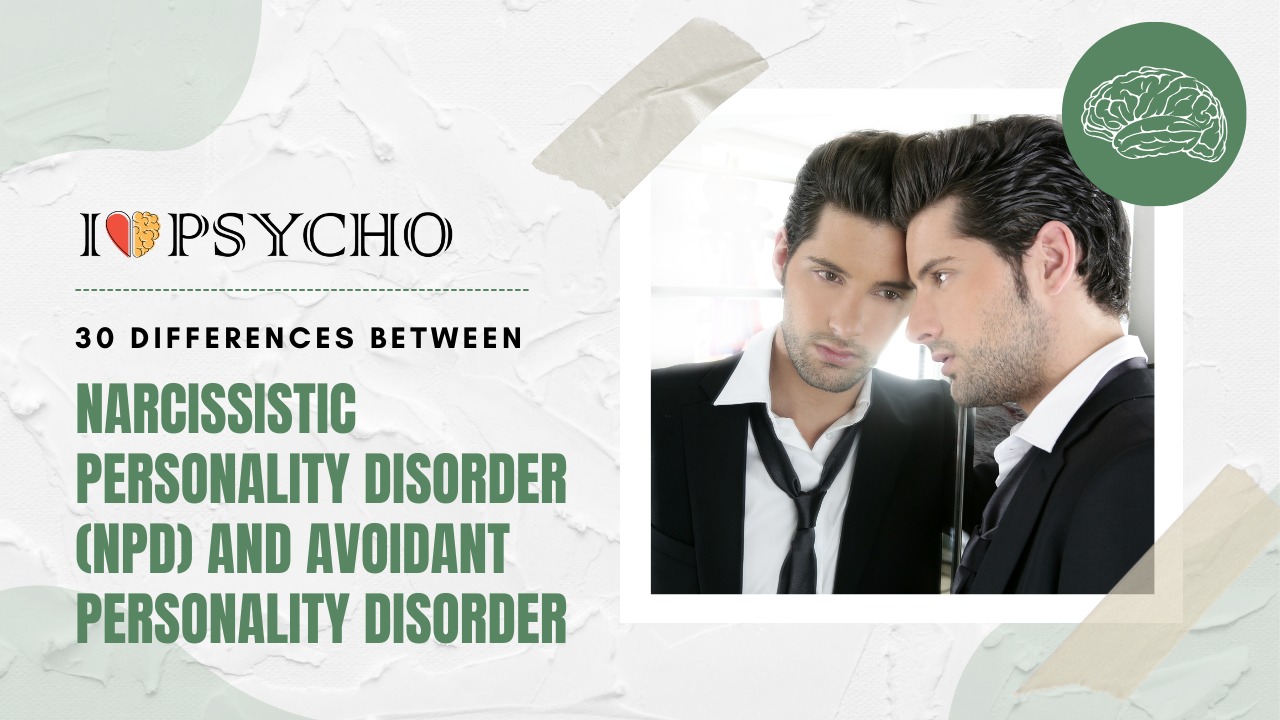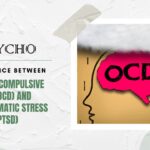The essential traits and behaviors of Narcissistic Personality Disorder (NPD) and Avoidant Personality Disorder differ greatly. NPD is characterized by a desire for adulation, a lack of empathy, and exaggerated self-importance. To preserve their self-image, NPD patients often manipulate others, while having low self-esteem.
However, Avoidant Personality Disorder causes social avoidance and feelings of inadequacy due to a crippling fear of rejection and criticism. Avoidant people have poor self-esteem but no grandiosity, unlike NPD. NPD people need attention and adoration, whereas avoidant people isolate themselves to avoid rejection. The former exploits people for selfish benefit, while the latter is socially shy and hypersensitive to criticism. owing to their self-centeredness, NPD can cause interpersonal problems, whereas avoidant people may have limited relationships owing to their isolation.
NPDers pursue unachievable objectives, while avoidants avoid circumstances where they could fail. NPD might originate through excessive pampering or criticism, whereas avoidant behaviors can result from early rejections. NPD therapy reduces grandiosity and fosters empathy, whereas avoidant therapy gradually exposes them to social circumstances and builds self-esteem.
NPD people deny having a problem, whereas avoidant people want social ties but struggle due to anxiety. In conclusion, NPD is characterized by grandiosity and a lack of empathy, while APD is characterized by social isolation motivated by an extreme fear of rejection.
Here are 30 differences between Narcissistic Personality Disorder (NPD) and Avoidant Personality Disorder:
|
S.No. |
Aspects |
Narcissistic Personality Disorder (NPD) |
Avoidant Personality Disorder |
|
1 |
Diagnostic Category |
Cluster B Personality Disorder. |
|
|
2 |
Self-Image |
Exaggerated sense of self-importance and grandiosity. |
Persistent feelings of inadequacy and inferiority. |
|
3 |
Self-Esteem |
Fragile self-esteem, easily threatened. |
Low self-esteem and self-worth. |
|
4 |
Need for Admiration |
Craves admiration and validation from others. |
Avoids situations where they might be criticized or rejected. |
|
5 |
Empathy |
Lacks empathy and often exploits others. |
Sensitive to criticism and highly empathetic. |
|
6 |
Relationships |
May have difficulty maintaining long-term, meaningful relationships. |
Struggles with initiating and maintaining relationships. |
|
7 |
Social Interaction |
Often dominates conversations and seeks attention. |
Avoids social situations and is reserved. |
|
8 |
Self-Centeredness |
Highly self-centered and preoccupied with self. |
Self-preoccupied but out of fear of negative judgment. |
|
9 |
Sensitivity to Rejection |
May not be particularly sensitive to rejection. |
Highly sensitive to rejection. |
|
10 |
Grandiosity |
Exhibits grandiose fantasies or behaviors. |
Lacks grandiose fantasies; more self-effacing. |
|
11 |
Criticism Response |
Reacts defensively to criticism and may become hostile. |
Takes criticism to heart and becomes anxious. |
|
12 |
Social Isolation |
May isolate themselves due to interpersonal conflicts. |
Isolates themselves to avoid potential criticism. |
|
13 |
Self-Presentation |
Presents a confident and self-assured exterior. |
Presents as shy, anxious, or socially awkward. |
|
14 |
Attention-Seeking |
Actively seeks attention and admiration. |
Avoids attention and prefers to blend in. |
|
15 |
Narcissistic Injury |
Prone to narcissistic injury when their self-image is threatened. |
Avoids situations that might trigger self-esteem damage. |
|
16 |
Envy |
May envy others’ success or accomplishments. |
Tends not to envy others but feels inadequate in comparison. |
|
17 |
Social Anxiety |
May not experience social anxiety. |
Typically experiences social anxiety. |
|
18 |
Emotional Regulation |
May struggle with regulating emotions and lash out. |
Often suppresses emotions to avoid social embarrassment. |
|
19 |
Fantasies |
Has fantasies of unlimited success, power, and beauty. |
Lacks fantasies of being exceptionally successful or attractive. |
|
20 |
Need for Affection |
Craves admiration more than affection. |
Craves affection but is anxious about seeking it. |
|
21 |
Self-Promotion |
Self-promotes and brags about achievements. |
Tends to downplay achievements. |
|
22 |
Fear of Criticism |
Less fear of criticism, may dismiss or belittle critics. |
Intense fear of criticism and rejection. |
|
23 |
Self-Image Stability |
Self-image is stable but grandiose. |
Self-image is stable but negative. |
|
24 |
Idealized Self |
Identifies with an idealized self-image. |
Lacks an idealized self-image. |
|
25 |
Need for Control |
May seek control and power over others. |
Less inclined to seek control over others. |
|
26 |
Relationships Motivation |
Driven by a desire to be admired and superior to others. |
Driven by a fear of rejection and criticism. |
|
27 |
Manipulative Behavior |
May engage in manipulative behavior to achieve their goals. |
Tends not to manipulate others but may avoid them. |
|
28 |
Awareness of Personality Traits |
May lack insight into their personality traits. |
Often has insight into their avoidance tendencies. |
|
29 |
Need for Independence |
Often seeks independence and dominance. |
May desires independence but fears it. |
|
30 |
Response to Neglect |
May respond to neglect with anger or frustration. |
Responds to neglect with withdrawal and self-blame. |
Also Read: 28 Difference between Bipolar Disorder and Cyclothymic Disorder
Frequently Asked Questions (FAQs)
Q.1 What is Narcissistic Personality Disorder (NPD)?
Narcissistic Personality Disorder is characterized by grandiosity, a desire for praise, and a lack of empathy. NPD sufferers frequently overestimate themselves, seek attention, and exploit others. Selfishness can make it hard to build and maintain good relationships with this condition.
Q.2 What Defines Avoidant Personality Disorder?
Avoidant Personality Disorder causes high sensitivity to criticism and rejection, leading to social avoidance. This condition causes poor self-esteem and a fear of humiliation, thus sufferers withdraw themselves to avoid rejection. This may hinder their socialization.
Q.3 How Do These Disorders Differ in Behavior?
Arrogant NPD people use others for selfish advantage and expect adoration. Their empathy is lacking and they rarely care about others. However, persons with Avoidant Personality Disorder avoid social events for fear of judgment. They may want relationships but avoid them owing to rejection phobia.
Q.4 What Are the Underlying Causes?
Genetic susceptibility and environmental influences including childhood praise and criticism can cause NPD. Avoidant Personality Disorder may result from early rejections or painful events that cause dread of criticism. Genetics and temperament also predispose people to this illness.
Q.5 Are These Disorders Treatable?
NPD and APD treatments differ. Grandiosity, empathy, and anxieties are typically addressed in NPD therapy. People with NPD may be reluctant to admit their issues. Therapy for Avoidant Personality Disorder gradually exposes patients to social interactions to boost self-esteem and anxiety management.








